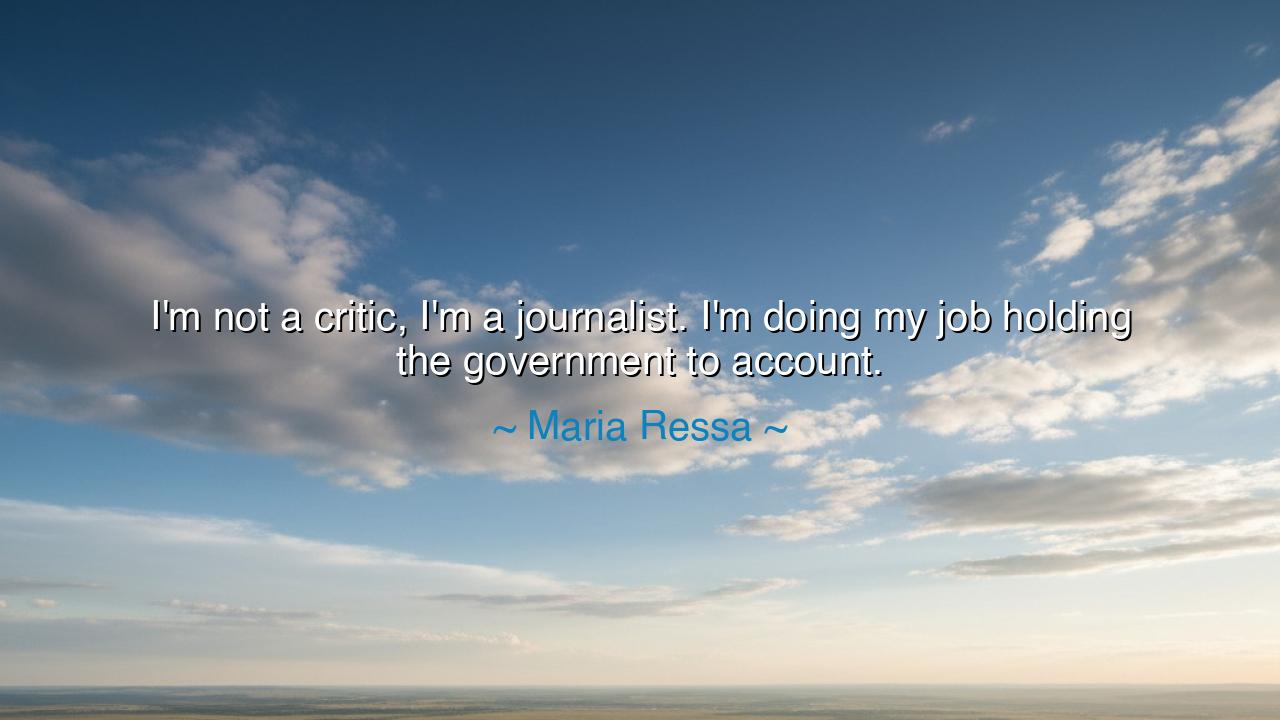
I'm not a critic, I'm a journalist. I'm doing my job holding the
I'm not a critic, I'm a journalist. I'm doing my job holding the government to account.






In the chronicles of our age, where truth often trembles before the roar of power, the voice of Maria Ressa rises like a beacon through the storm: “I’m not a critic, I’m a journalist. I’m doing my job holding the government to account.” These words, simple yet mighty, echo the timeless duty of those who serve truth above fear, light above comfort. For the journalist, in the ancient sense, is not a mere observer of events but a guardian of conscience — a keeper of the flame that must never be allowed to die.
Maria Ressa spoke these words not from the safety of comfort, but amid peril. In her homeland, the Philippines, she stood before the powers of state, accused and condemned for daring to reveal what was hidden. Yet she did not bow, nor call herself a victim. She declared her role plainly, as one might declare allegiance to a higher law: she was no critic, hurling stones from the shadows, but a journalist, whose sacred duty was to seek truth and hold those who rule accountable to the people they serve. Her words remind us that journalism, when it is true, is not opposition—it is responsibility.
From the days of old, this duty has belonged to the brave. Recall the tale of Diogenes, the philosopher who wandered Athens with a lantern in broad daylight, searching for an honest man. He too was misunderstood, mocked, even feared by the powerful. Yet he cared not for approval; he sought only truth. The journalist, like Diogenes, carries the same lantern — shining it into the dark corners where deceit dwells, though it may blind the eyes of kings. For truth, when revealed, humbles the mighty and frees the bound.
The critic speaks with judgment; the journalist speaks with witness. One condemns from the outside; the other stands within the storm, recording faithfully the cries, the injustice, the courage, and the corruption. Maria Ressa’s words draw a sacred line between cynicism and duty. To be a critic is easy—anyone can condemn. But to be a journalist, to bear witness when lies threaten to drown the world, that is to stand upon the narrow bridge between truth and terror. And in that act of standing, the journalist becomes the living conscience of a nation.
When the rulers of a land forget their promise to the people, when they clothe falsehood in the garments of authority, it is the journalist who must speak. Think of Watergate, when two reporters, Woodward and Bernstein, followed a thread of truth through walls of denial until it brought down a president. They were not critics seeking fame; they were servants of truth, performing their duty under the watch of a free people. Their courage restored balance to the republic — proof that the pen, when guided by conscience, can strike more deeply than the sword.
Yet this calling is not without cost. The truth-teller often walks alone, burdened by threats and misunderstanding. Many have paid dearly for their devotion—Anna Politkovskaya, who spoke against oppression in Russia, silenced by bullets; Daphne Caruana Galizia, slain for exposing corruption in Malta; and Maria Ressa herself, imprisoned not in chains, but in the cruel weight of legal persecution. Their stories are written not in ink, but in courage. They remind us that freedom of the press is not a gift—it is a covenant, renewed each day by those willing to risk all for truth.
The lesson, dear listener, is this: the duty to hold power to account does not belong only to journalists, but to every soul who values freedom. Each of us must be a keeper of truth in our own sphere — in the workplace, in the family, in the quiet conversations where integrity is tested. Speak truth even when it trembles on your tongue; stand for what is right even when the world prefers silence. For if no one dares to question, power forgets humility, and nations lose their soul.
Therefore, let the spirit of Maria Ressa be your guide. Let her courage remind you that truth is not the enemy of peace, but its foundation. Be not a critic who scoffs, but a witness who stands. Seek the truth not to destroy, but to heal. And when the powerful grow deaf to the cries of the people, may your voice rise—not in anger, but in resolve—saying, as she did, “I am not a critic. I am doing my job, holding the world to account.” For in that act, you, too, become a guardian of light in an age of shadows.






AAdministratorAdministrator
Welcome, honored guests. Please leave a comment, we will respond soon